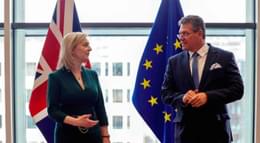
How Britain should negotiate trade
If the Government is to secure mutually beneficial trade arrangements with our European neighbours then it needs a change in approach, says Shanker Singham.
The timing and sequencing of trade negotiations is a subject that does not command much attention from commentators. Yet, many of the substantive discussions are in danger of becoming academic if this issue is not better understood.
By contrast, the EU has shown a much stronger mastery of how the timing can be used to their advantage. The EU is the master of running the clock out on negotiations, and of setting up the chessboard to limit the parties' freedom of action.
Interconnection of Key Elements of Trade Negotiations
We at the Institute of Economic Affairs have written extensively on the UK's four-pillared trade policy approach, which is not unique to the UK, but is the basis of any country's trade policy. What is sometimes not well understood is how these different negotiations all interconnect, and that actions taken in each pillar have an impact on the other pillars.
Obviously, the negotiation with the EU will determine what the capacity is of the UK to actually execute an independent trade policy. The more closely locked into EU regulation the UK is, the less flexibility it will have to negotiate trade agreements with others or operate freely in the World Trade Organization (WTO).
One less obvious example of this is the problem of retaining two mutually exclusive customs proposals on the table at the same time. It is obvious that being unable to prepare for no trade agreement substantially weakens the UK's leverage with the EU. Less obviously, since this prevents the UK moving forward in any negotiations (for example on agricultural import quotas with tariff-rate quote partners), it has profound impacts on the WTO transition process, even though at first blush it looks like it relates to the UK-EU relationship only. We have already seen this play out in Britain's delayed accession application to the WTO's Government Procurement Agreement.
Use of Leverage
Leverage comes in many forms. Direct leverage relates to those areas where the UK has leverage simply by virtue of the EU needing access to a particular sector. The best example of this is the need for EU financial services firms to have access to the City of London. It also relates to the fact that there should not be a fragmentation of the single capital pool in the City of London. Any fragmentation could lead to an increase in the cost of capital by as much as 15-20 basis points. This would lead to deals being aborted in the EU-27.
In any event, any attempt to fragment clearing and settlement operations promoted by the European Central Bank (ECB) or other European authorities would lead to a volcanic reaction from the US. It should be noted that there is already a framework for clearing which is a UK-US regulatory framework. Any attempt to destabilise this by the EU would cause the US to support the UK's position.
Indirect leverage arises from the use of certain other negotiations the UK may be engaged in. It would include things like concurrent negotiations (with the US and the Trans-Pacific Partnership and so forth) so that the negotiations are not sequenced in such a way that the EU negotiation has to take place before any others (which would be in the EU's interest, but not in Britain's). As a matter of law, an exiting member state can negotiate trade agreements (but not implement them). The UK should use that legal power to initiate negotiation of free-trade areas with as wide a group of countries as possible and include serious discussion of acceding to platform agreements such as the North American Free Trade Association and the Trans-Pacific Partnership.
In addition to free trade area negotiations, this could also include the tariff-rate quota negotiations where the EU has significant defensive interests, as they will be limited in their capacity to liberalise in the future. The EU's schedules are also not complete and this gives the UK some leverage. Britain's ability to negotiate bilaterally in the tariff-rate quotas and general WTO modification process (under Article XXVIII) will be critical to developing indirect leverage.
Defensive Tactics
While much is made of the duty of sincere cooperation which the UK owes to the EU, the EU also owes a duty of sincere cooperation to an exiting member state (since the exit process is governed by the Treaties), in particular to make sure that this exiting member state is not damaged in its vital WTO transition and other international trade processes. We are beginning to see a track record of EU lack of cooperation with very reasonable UK requests. There will come a point at which this lack of cooperation amounts a violation of that duty. In such case, the UK must be prepared to litigate.
Setting up the Chessboard
Much trade negotiation consists of setting up the chessboard. Part of this relates to teeing up concurrent negotiations and managing the WTO transition process. The EU is the other player in this game. The UK should therefore initiate serious negotiations with other countries such as the US, and the key TPP countries, as an exiting member state has every right to exit without being damaged, and that is consistent with the duty of sincere cooperation.
EU process in context
In this context, it is clearly vital that the UK initiates negotiations with the EU as soon as possible. The only way to really do this is to start submitting text as a matter of urgency.
It is likely that that the EU would welcome text as the Commission is constantly saying that it does not know what the UK actually wants. Submission of text is the starting point for meaningful negotiations, as speeches and papers cannot be relied on in an actual trade negotiation, although they are useful in the pre-negotiation phase.
The UK should also make sure it does not create a negotiating dynamic where the EU can get what it wants simply by doing nothing. If the EU knows that in the event of no agreement, its preference of the UK in the customs union and single market as a rule-taker can be achieved, it knows that no country will negotiate with the UK, and it does not need to conduct further serious negotiations. In this event, the EU is likely to keep negotiations alive, but not make serious concessions, knowing that the UK is unlikely to be able to make progress with other countries.
The UK has so far been trapped by the Irish backstop discussion. What the EU wants would end the negotiations without them having started, or completely separate the UK's single market. While it is a slightly different situation, in the NAFTA renegotiation, the Canadians and Mexicans did not say they needed a backstop, so if the negotiations failed, the status quo would be maintained. It would have been absurd to do so.













